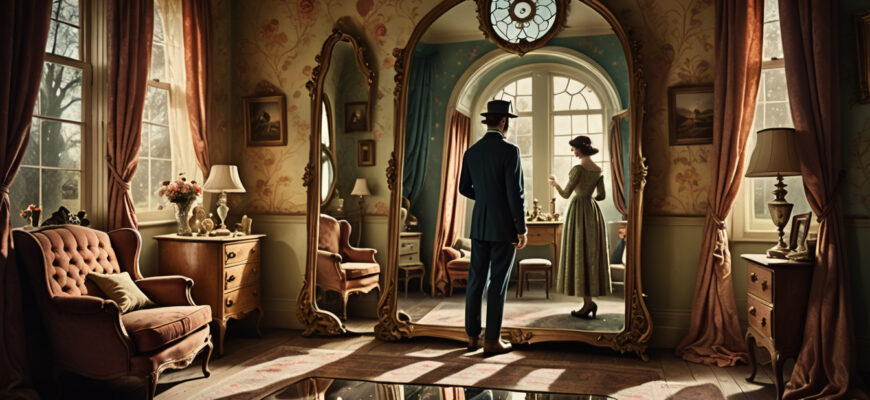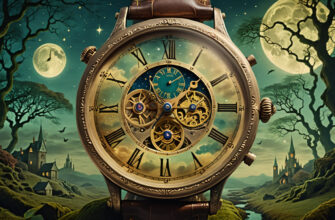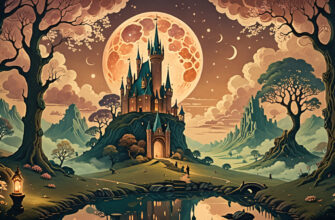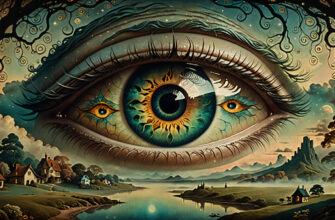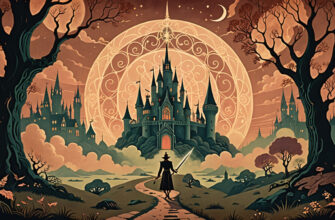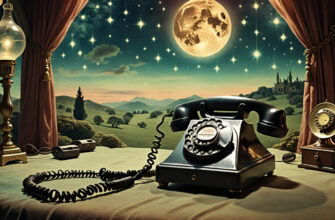Waking up from a mirror dream can leave you feeling twisted inside—like someone dropped a truth bomb while you were asleep and bolted before you had a chance to process it. Whether you saw your face morph into a stranger’s, couldn’t find your reflection at all, or watched a cracked mirror slowly fall apart, one thing’s clear: your subconscious isn’t playing it safe. These aren’t just visuals. They’re messages from your psyche, wrapped in fractured glass and flashing lights, begging for a deeper look. People are already searching for clarity in the middle of the night, typing things like “Why did my reflection look scary?” or “What does it mean if I can’t see myself in a mirror dream?” The connection runs deep—right into the rawest parts of our emotional and spiritual core. This article won’t sugarcoat it. These dreams are about confronting what you’ve buried: shame, identity crisis, unattached emotions, things you don’t tell your therapist yet. Think of it like shadow work you didn’t sign up for, but clearly needed. Mirror dreams don’t knock—they force the door open. Here’s where we stop pretending and start revealing.
- Common Mirror Dreams You’ve Probably Had (And Never Wanted To)
- Table Of Mirror Symbolism And Emotional Triggers
- Why Mirror Dreams Hit So Hard (And Stick With You)
- This Isn’t Just A Dream—This Is A Confrontation
- Sexuality, Shame, and the Erotic Mirror
- Mirror Possession and Spiritual Red Flags
- What Are You Avoiding? The Deeper Message of Mirror Dreams
Common Mirror Dreams You’ve Probably Had (And Never Wanted To)
- Dreaming of a cracked mirror — Feels like bad luck? It might be something deeper—like cracks in your self-image, guilt breaking through, or emotional betrayal.
- Looking into a mirror and seeing nothing — This one’s haunting. It taps into invisibility, lack of identity, feeling erased by the people or roles in your life.
- Seeing a distorted or unfamiliar version of yourself — It could be older, younger, injured, or straight-up terrifying. Either way, it’s your mind telling you that you don’t feel like you anymore. It’s a direct call-out to face what parts of your identity feel fake, broken, or abandoned.
- Being unable to look at your reflection — Avoidance in its purest psychological form. What shame or self-hate are you hiding behind? It’s like the dream’s saying, “You don’t want to see who you’ve become, do you?”
- Haunted mirrors or mirrors in dark rooms — Welcome to the spiritual danger zone. This usually shows up when something—energy, memory, entity, grief—is unwilling to leave. It’s unsettled business, spiritual clutter, or even ancestral trauma popping into your dream feed.
Table Of Mirror Symbolism And Emotional Triggers
| Dream Symbol | Possible Interpretation |
|---|---|
| Cracked Mirror | Loss of confidence, recent emotional fallout, or fear of change |
| No Reflection | Identity crisis, invisibility in relationships, feeling lost or dismissed |
| Distorted Face | Unprocessed trauma, body image distortion, repressed anger or self-hate |
| Refusing To Look | Deep denial, emotional shutdown, shame-based avoidance |
| Dark Room + Mirror | Energetic blockage, spiritual interference, unresolved grief or fear |
Why Mirror Dreams Hit So Hard (And Stick With You)
You don’t forget a mirror dream easily. Even if the details go fuzzy, the feeling lingers—like your soul just walked through barbed wire and now you have to keep smiling through daily life. These dreams mess with your head because mirrors are more than glass. They’re emotional amplifiers. Dream mirrors aren’t asking what you look like—they’re asking who you’ve become.
People who dream about mirrors are often going through something major under the surface:
- Questioning their personal identity
- Suppressing anger, shame, or grief
- Feeling spiritually disconnected or overwhelmed
- Fearing judgment—their own or someone else’s
So when they dream, it leaks out in images that shake them awake. Picture this: You walk up to a mirror, knowing something’s off. You feel it. And then your reflection smiles…but your actual face doesn’t. That’s the subconscious saying, “We see your mask. Time to peel it off.”
This Isn’t Just A Dream—This Is A Confrontation
Most dreams let you escape. Mirror ones trap you. They make you notice every scar, every mask, every fake smile you’ve been performing. That’s why the reflection talks back, or vanishes entirely. It’s less dream, more reckoning.
This isn’t about dream interpretation the way your grandma did it. This is spiritual forensic work, laced with emotional bruises and psychic residue. When you walk away from a mirror dream disturbed or confused—good. That means it did its job. Now it’s your turn to listen.
Whether your mirror cracked in half or your eyes wouldn’t meet your own, the point is the same: your subconscious dragged a piece of your shadow into broad daylight. You woke up for a reason. This is your invitation to stop avoiding, stop numbing, and ask, “What part of me am I so afraid to see?”
Sexuality, Shame, and the Erotic Mirror
What does it mean when you watch yourself having sex—in a mirror, in the middle of a dream, where everything’s blurry but hyper-real? Some people say it makes them feel holy. Others feel sick. It’s the razor-thin line between intimacy and voyeurism. When that mirror shows you mid-act, it’s not just image—it’s exposure. You’re either being seen or seeing yourself in ways you weren’t ready for.
For some, it’s a moment of power—owning your body, finally seeing desire without flinching. For others, it’s dissociation wearing lingerie. Especially for survivors of trauma, mirror-sex dreams carry loaded weight. Your identity can glitch. You shapeshift into someone else—someone older, more sexualized, more punished. You watch like you’re hovering above your own body, half-threat, half-ghost.
And then there’s the God layer. That creeping sense of being watched—not by a lover, but by something much bigger. Religious guilt creeps in. You feel dirty. Like you’ve stained a metaphorical sheet. It’s not always a person watching—it might be judgment, shame, or the inner voice that tells you you’re “too much.”
Ever dreamt that people were watching you through the mirror while you tried to touch or love yourself? That’s internalized shame—thick and loud. The kind that leaves a film over your desire. These dreams unearth what we’ve buried: fear of being judged, craving to be witnessed, terror of being known.
Mirror Possession and Spiritual Red Flags
Some mirrors don’t just reflect. They act alive. Dreaming of a shaking mirror? That’s not just a bad dream—it can feel like a psychic siren blaring. Sometimes, the glass won’t show your face, or it flat-out refuses to reflect anything at all. That’s not a glitch—it’s a sign your spirit is trying to scream.
People talk about seeing someone else’s face where their own should be. A dead grandmother. An ex they can’t shake. An unknown woman watching silently. These aren’t always ghosts; sometimes they’re broken parts you haven’t claimed. Or worse—they’re clues you’re spiritually open to stuff you haven’t invited in.
- Dreaming about a haunted mirror? You might be carrying energy that isn’t yours.
- The mirror moves on its own? Message pending. Your guides—or your own intuition—have something unspoken to say.
- Feel like you’re being possessed through the mirror? That feeling’s real. You might be absorbing emotional garbage from past trauma or feeling energetically hijacked in your waking life.
What Are You Avoiding? The Deeper Message of Mirror Dreams
Waking up from a mirror dream can shake you to the bone. You stare at the ceiling wondering what the hell your brain just tried to show you—and why it hit that hard. That’s your subconscious tossing a mirror at your feet. It’s not random. It’s an unfiltered glimpse into what you’re not dealing with.
Before brushing it off, sit with these questions:
- What emotion did you feel in the dream? Fear, desire, guilt, hope?
- Did the reflection change—and into what?
- Was there a part of you missing from the mirror, or something extra?
- What version of you showed up—and is that version getting hidden in real life?
Mirror dreams call you out. Think of them like back-alley therapy—raw, surreal, but honest as hell. They show you the parts of yourself you’ve tried to pretty up or shove underground. And sometimes the message is brutal clarity: You’re not who you pretend to be, and you know it.
Integration starts with naming what the mirror showed you. You don’t have to fix it all at once. You just have to stop avoiding the reflection and start listening.
